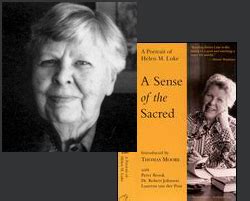A Quote by Hermann Hesse
The diabolical thing about melancholy is not that it makes you ill but that it makes you conceited and shortsighted; yes almost arrogant. You lapse into bad taste, thinking of yourself as Heine's Atlas, whose shoulders support all the world's puzzles and agonies, as if thousands, lost in the same maze, did not endure the same agonies.
Related Quotes
The terms good and bad indicate no positive quality in things regarded in themselves, but are merely modes of thinking or notions, which we form from the comparison of things one with another. Thus one and the same thing can be at the same time good, bad, and indifferent. For instance, music is good for him that is melancholy, bad for him that mourns; for him that is deaf; it is neither good nor bad.
To disguise nothing, to conceal nothing, to write about those things that are closest to our pain, our happiness; to write about our sexual clumsiness, the agonies of Tantalus, the depth of our discouragement-what we glimpse in our dreams-our despair. To write about the foolish agonies of anxiety, the refreshment of our strength when these are ended; to write about our painful search for self, jeopardized by a stranger in the post office, a half-seen face in a train window, to write about the continents and populations of our dreams, about love and death, good and evil, the end of the world.
The same thing that Uncle Tom did on the plantation before [Abe] Lincoln issued the so-called Emancipation Proclamation.I have no thinking on the matter. But he's teaching the black people to suffer peacefully, patiently, until the white man makes up his mind that you're a human being the same as he.
Some people think it's psuedo-science, but it's called morphic resonance. It's when someone thinks of an idea, it makes it easier for someone else to think of the idea. That's why you should do crossword puzzles later in the day, because other people have thought about the answers. That's why you hear about people coming up with inventions almost at the same time, because someone else is thinking about it. That's why whenever I have a really good idea, I'm always worried about theft.
When I do something I have to do it all the way - that goes for music, with a high-hat, a snare drum, a rhyme, everything. I have to push it to the extreme. That's how I realized I have addictive behavior. Somebody told me this once, that the thing that makes me bad is the same thing that makes me good at other things.
...the only thing that makes the Church endurable is that it is somehow the body of Christ and that on this we are fed. It seems to be a fact that you have to suffer as much from the Church as for it but if you believe in the divinity of Christ, you have to cherish the world at the same time that you struggle to endure it.
When I was really sad, I would be like a little kid wiggling a loose tooth or touching a sore spot - there were things that I did to make myself sadder. It was almost as if I were luxuriant in my own melancholy. Looking at the diaries and thinking about my old self, thinking about my lost youth - that was part of that project of making myself totally miserable.
The Saint whose water can light lamps, the clairvoyant whose lapse in recall is the breath of God, the true paranoid for whom all is organized in spheres joyful or threatening about the central pulse of himself, the dreamer whose puns probe ancient fetid shafts and tunnels of truth all act in the same special relevance to the word, or whatever it is the word is there, buffering, to protect us from. The act of metaphor than was a thrust at truth and a lie, depending where you were: inside, safe or outside, lost.
It’s the same with people who say, ‘Whatever doesn’t kill you makes you stronger.’ Even people who say this must realize that the exact opposite is true. What doesn’t kill you maims you, cripples you, leaves you weak, makes you whiny and full of yourself at the same time. The more pain, the more pompous you get. Whatever doesn’t kill you makes you incredibly annoying.





































